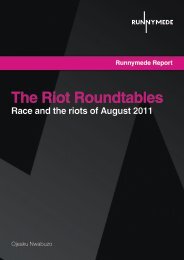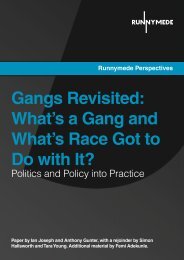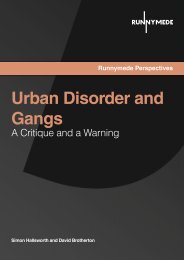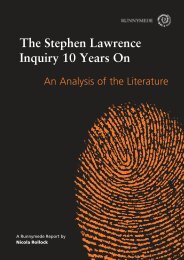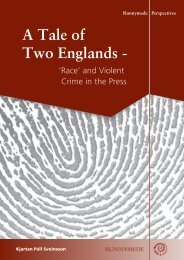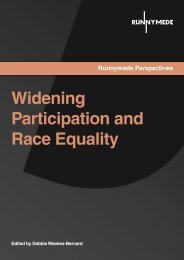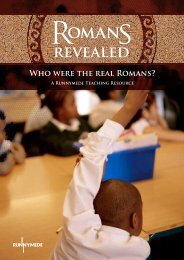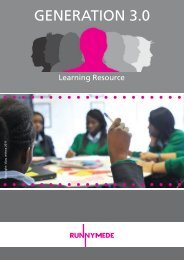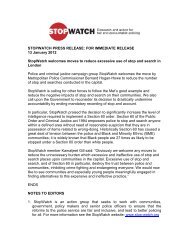PARENTINg - Runnymede Trust
PARENTINg - Runnymede Trust
PARENTINg - Runnymede Trust
You also want an ePaper? Increase the reach of your titles
YUMPU automatically turns print PDFs into web optimized ePapers that Google loves.
news<br />
Police Apology Offered to Family of a<br />
Murdered Victim for Not Acknowledging<br />
Racial Motivation<br />
The Scottish Police Force has<br />
admitted that the murder of a<br />
Chinese man should have been<br />
treated as a hate crime. Last year on<br />
August 12, Simon San was murdered<br />
in Edinburgh by a gang of youths. At<br />
the time of the incident, San’s family<br />
had reported to the police that they<br />
believed that the attack had been<br />
racially motivated. Eye witness<br />
statements had also reported racial<br />
slurring from San’s murderers;<br />
however the death was still treated<br />
as lacking a racial element.<br />
After a year-long enquiry into the<br />
handling of Simon San’s death, the<br />
police have offered a public apology<br />
to his family. The results of the enquiry<br />
have found that San’s murder was<br />
not identified as a ‘critical incident’<br />
but rather as the result of a robbery.<br />
San’s murderers had previous racist<br />
records which went unaccounted;<br />
the police wrongly classified San as<br />
Vietnamese; and they did not deal<br />
with the perception of the family<br />
properly. However, as a result of the<br />
enquiry, the officers involved have<br />
received a formal discipline and the<br />
procedures of the force have been<br />
subject to change.<br />
Nonetheless, racism toward the<br />
Chinese population has been<br />
flagged as an element that the police<br />
have not been taking seriously. The<br />
University of Leeds, University of<br />
Hull and Nottingham Trent University<br />
published a report in April 2009 called<br />
Hidden from Public View? Racism<br />
against the UK Chinese Population.<br />
This report established that the<br />
police were found to be a problem<br />
when Chinese victims had to engage<br />
with them regarding hate crime. The<br />
report grouped their respondents’<br />
feelings of their interaction with the<br />
police under the following categories:<br />
‘late response’, ‘no follow-up’, ‘few<br />
prosecutions’, ‘lack of interpreting<br />
services’, ‘alleged discrimination<br />
against Chinese victims by police<br />
officers’ and ‘limited action to tackle<br />
concerns’.<br />
Equality Act under Review<br />
The first caste discrimination tribunal<br />
held this August has led home<br />
secretary Theresa May to reconsider<br />
the Equality Act. An Indian couple who<br />
both worked for the firm of solicitors<br />
Heer Manak in Coventry sued their<br />
employers for discrimination after<br />
announcing their marriage plans.<br />
They believe that as a result of<br />
their engagement and consequent<br />
marriage they were unfairly treated<br />
by their company because they are<br />
from different caste groups.<br />
The Equality Act, which was<br />
amended in 2010, bans unfair<br />
treatment on the grounds of age,<br />
disability, gender reassignment,<br />
marriage and civil partnership,<br />
pregnancy and maternity, race,<br />
religion or belief, sex, and sexual<br />
orientation and helps achieve equal<br />
opportunities in the workplace and<br />
in wider society. Theresa May is now<br />
considering whether to add caste<br />
to the categories monitored as a<br />
result of the trial. Article 1 Part 1 of<br />
the International Convention on the<br />
Elimination of All Forms of Racial<br />
Discrimination cites race, colour,<br />
descent, or national or ethnic origin<br />
as their categories for protection and<br />
so includes caste under descent as<br />
an identity open to discrimination.<br />
<strong>Runnymede</strong> and other UK NGOs<br />
have been concerned about castebased<br />
discrimination for some time<br />
and this has been addressed to the<br />
UN Committee on the Elimination of<br />
Racial Discrimination (CERD) this<br />
summer. The joint recommendation<br />
has been forwarded to the committee<br />
that the UK government take on<br />
caste discrimination as an aspect of<br />
race discrimination.<br />
Although the Indian Caste system is<br />
no longer grounds for segregation<br />
in India, a hierarchy based on birth<br />
and occupation still exists. At the top<br />
of the system sits Brahmin (priests<br />
and teachers), followed by Kshatriya<br />
(rulers and soldiers), Vaishya<br />
(merchants and traders), Sudra<br />
(labourers and artisans) and with<br />
the Untouchables/Dalits (deemed<br />
pollutants) at the bottom.<br />
In December last year the Home<br />
Office released a report by Hilary<br />
Metcalf and Heather Rolfe on Caste<br />
Discrimination and Harassment in<br />
Great Britain, further supporting the<br />
need to address this issue within UK<br />
law.<br />
6 | RUNNYMEDE BULLETIN | Autumn 2011 / issue 367 www.runnymedetrust.org



